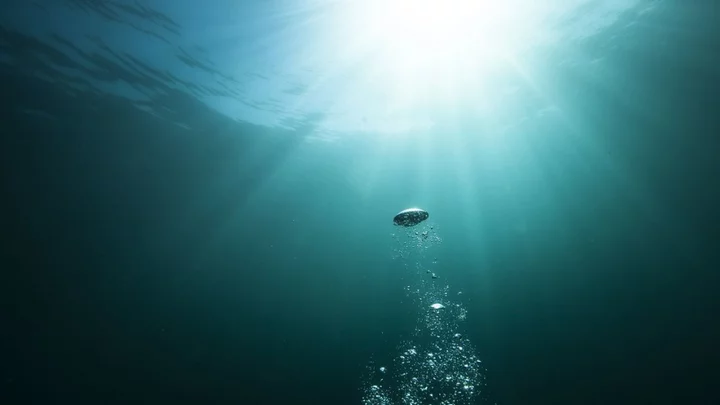
James Gunn 'blown away' by Superman Legacy auditions
DC Studios chief James Gunn has been "blown away" by auditions for 'Superman: Legacy' as the team look to cast the next Clark Kent.
2023-06-20 15:20

Scientists found the oldest water on the planet and drank it
If you found water that was more than two billion years old, would your first instinct be to drink it? One scientist did exactly that after finding the oldest water ever discovered on the planet. A team from the University of Toronto, led by Professor Barbara Sherwood Lollar, came across an incredible find while studying a Canadian mine in 2016. Tests showed that the water source they unearthed was between 1.5 billion and 2.64 billion years old. Given that it was completely isolated, it marked the oldest ever found on Earth. Sign up to our free Indy100 weekly newsletter Remarkably, the tests also uncovered that there was once life present in the water. Speaking to BBC News, professor Sherwood Lollar said: “When people think about this water they assume it must be some tiny amount of water trapped within the rock. “But in fact it’s very much bubbling right up out at you. These things are flowing at rates of litres per minute – the volume of the water is much larger than anyone anticipated.” Discussing the presence of life in the water, Sherwood Lollar added: “By looking at the sulphate in the water, we were able to see a fingerprint that’s indicative of the presence of life. And we were able to indicate that the signal we are seeing in the fluids has to have been produced by microbiology - and most importantly has to have been produced over a very long time scale. “The microbes that produced this signature couldn’t have done it overnight. This has to be an indication that organisms have been present in these fluids on a geological timescale.” The professor also revealed that she tried the water for herself – but how did it taste? “If you’re a geologist who works with rocks, you’ve probably licked a lot of rocks,” Sherwood Lollar told CNN. She revealed that the water was "very salty and bitter" and "much saltier than seawater." Have your say in our news democracy. Click the upvote icon at the top of the page to help raise this article through the indy100 rankings.
2023-06-20 14:55

WIN SOURCE Makes its Mark at PCIM Europe 2023 with a Commitment to Sustainable Development
SHENZHEN, China--(BUSINESS WIRE)--Jun 20, 2023--
2023-06-20 14:49

6 hacks for handling the heatwave at a festival
With the heatwave stretching on this summer, festival-goers may be worried about handling the hot temperatures. The medical team at the Isle of Wight Festival said they saw fewer heat-related issues than expected, but there has still been a 15% rise in incidents since last year. With Glastonbury temperatures predicted to fall between 21 and 25 degrees, how can you make sure you stay safe? 1. Find shade – anywhere on the site When you see photos and videos of festival sites, it can look pretty exposed to the elements. “At festivals, seek shade in festival tents or near stages, or by going to bars… Even take a gazebo to go with your tent [if the festival allows],” says associate medical director of St John Ambulance, David Monk. When out in the field, take an umbrella or parasol if you are worried, Monk explains. And also, consider “wearing light layers and a cap”, he says. “Perhaps take a wet cloth to pop on the back of your neck, or wet the cap and wear it to cool you.” 2. Put sun cream everywhere “Make sure you wear a good head covering, at least SPF 30, and reapply regularly, so take it into the festival with you. When you get sweaty, it will need reapplying,” Monk explains. If you are dressing up in wild clothing, “apply sun cream before putting it on and reapply it, and make sure you take something to wear when it starts getting cooler”, he explains. “Put sun cream under make-up and glitter, and look at a sun cream spray for your scalp” – especially important if you don’t want to wear a hat. 3. Know what to look out for Knowing the signs of heatstroke and severe burns is vital. The main risks are sunburn, heatstroke and heat exhaustion. “Heat exhaustion is something you can self-treat by drinking lots of water or weak squash, and eating salty foods. If you think you have heatstroke, however, seek help from the medical teams,” Monk says. Signs include not sweating despite being hot, and a reduced level of consciousness, he adds. “If you get burnt, think how bad it is. If it blisters, you feel unwell or are shivering, seek help from the festival medical teams.” They should be fairly easy to find and signposted – ask around if you can’t see any. However, if it is less severe, just do lots of moisturising and rehydrating, he suggests. 4. Drink water and know how hydrated you are “Drink alcohol in moderation, and drink water alongside it. When you go to the loo, check how dark your urine is,” Monk suggests. This isn’t always possible in festival toilets, but you might detect darker and more dehydrated urine from its smell. 5. Pack the electrolytes When you sweat, you lose a lot of electrolytes, like salt. “Take an electrolyte drink with you – things like sports drinks, or Dioralyte, to replace whatever you lose,” says Monk. “Make sure you’re eating things with salt in, and carbohydrates, to give you energy.” 6. Keep an eye on drink and drugs “If people are going to take drugs, make sure those around you know what you have taken, in case they need to tell someone if there is a problem. Drugs and alcohol reduce your body’s ability to respond to the heat,” says Monk. Read More Charity boss speaks out over ‘traumatic’ encounter with royal aide Ukraine war’s heaviest fight rages in east - follow live Regular daytime naps could be good for the brain, study shows Meghan ‘set to sign’ Dior deal: 4 times she’s worn the brand Designer JW Anderson wears Irish rugby top on the runway
2023-06-20 14:45

Cambridge Broadband Networks Ltd. Africa and Tarana Announce Partnership to Equip Sub-Saharan Operators with Breakthrough Next-Gen Fixed Wireless
LAGOS, Nigeria & MILPITAS, Calif.--(BUSINESS WIRE)--Jun 20, 2023--
2023-06-20 14:25

Ending Nigeria's fuel subsidy pushes a shift to solar. Without a climate plan, progress is at risk
Nigeria's removal of a subsidy that helped reduce the price of gasoline has increased costs for people already struggling with high inflation
2023-06-20 14:18

World-Record Breaker, Business Leaders Missing on Titanic Tour
Five people are on board a submersible vessel that has gone missing in the North Atlantic during an
2023-06-20 13:52

Technip Energies Launches Canopy by T.EN™, Making Carbon Capture Accessible for Every Emitter
PARIS--(BUSINESS WIRE)--Jun 20, 2023--
2023-06-20 13:27

Oxford children's choir helps Ukrainian refugees 'not feel alone'
The group holds weekly session in Oxford for young refugees forced to flee their homes by war.
2023-06-20 13:20

Regular daytime naps could be good for the brain, study shows
Regular daytime naps could be good for brain health, new research suggests. Daytime napping could slow the rate at which brains shrink as we age, the study led by researchers at UCL and the University of the Republic in Uruguay found. The researchers hope their findings into the health benefits of sleeping during the day will reduce any stigma that still exists around daytime napping. The study suggests the average difference in brain volume between people programmed to be habitual nappers and those who were not was equivalent to 2.6 to 6.5 years of ageing. Our findings suggest that, for some people, short daytime naps may be a part of the puzzle that could help preserve the health of the brain as we get older Dr Victoria Garfield, UCL Senior author Dr Victoria Garfield, MRC Unit for Lifelong Health & Ageing at UCL, said: “Our findings suggest that, for some people, short daytime naps may be a part of the puzzle that could help preserve the health of the brain as we get older.” The study, published in the journal Sleep Health, analysed data from people aged 40 to 69. Past research has suggested people who have had a short nap perform better in cognitive tests in the hours afterwards than those who did not nap. The new study looked at whether there was a causal relationship between daytime napping and brain health. Researchers looked at 97 snippets of DNA thought to determine people’s likelihood of habitual napping. They compared measures of brain health and cognition of people who are more genetically programmed to nap with people who did not have these changes in DNA, using data from 378,932 people from the UK Biobank study. They found that, overall, people predetermined to nap had a larger total brain volume. The genetic variants – DNA changes – influencing the likelihood of someone to nap were identified in an earlier study looking at data from 452,633 UK Biobank participants. But the researchers did not find a difference in how well those programmed to be habitual nappers performed on three other measures of brain health and cognitive function. Lead author and PhD candidate Valentina Paz, University of the Republic (Uruguay) and MRC Unit for Lifelong Health and Ageing at UCL, said: “This is the first study to attempt to untangle the causal relationship between habitual daytime napping and cognitive and structural brain outcomes. “By looking at genes set at birth, Mendelian randomisation avoids confounding factors occurring throughout life that may influence associations between napping and health outcomes. “Our study points to a causal link between habitual napping and larger total brain volume.” Dr Garfield added: “I hope studies such as this one showing the health benefits of short naps can help to reduce any stigma that still exists around daytime napping.” Read More Dramatic rise in the number of women freezing their eggs Paramedics who found ‘poisoned’ couple dead in Mexico hotel room also fell ill Bruce Willis’ family honours him with first Father’s Day tributes since announcing his dementia diagnosis Richard Ford on Frank Bascombe, getting older and literary feuds: ‘At my age I can’t get into fistfights’ Families’ ‘disappointment’ as Croydon tram disaster driver cleared
2023-06-20 12:29

Search Underway for Titanic-Wreck Submersible With Five Crew
Searchers raced to find a submersible diving vessel with five people aboard that went missing in the North
2023-06-20 11:17

Ex-PM Cameron says the UK focused too much on flu rather than other potential pandemics before COVID
Former British Prime Minister David Cameron has told a public inquiry that his government made a mistake by focusing too much on preparations for a flu pandemic rather than considering other types of pandemic in the years before the COVID-19 outbreak
2023-06-20 10:24
